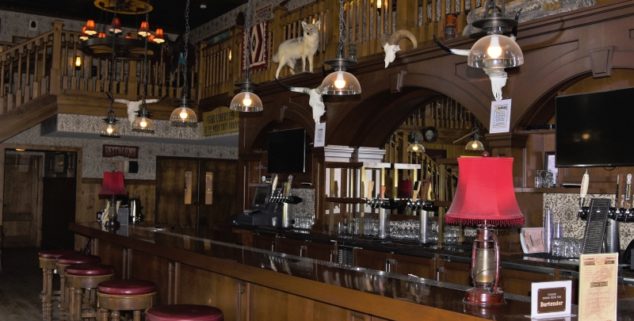News
Bottoms up: Should California bars serve booze until 4 am?
 The scene at the Last Kind Words Saloon in Furnace Creek, in Death Valley. (Photo: Thomas Trumpeter, via Shutterstock)
The scene at the Last Kind Words Saloon in Furnace Creek, in Death Valley. (Photo: Thomas Trumpeter, via Shutterstock)Jerry Brown said the bill would cause “mayhem” and vetoed it, now its author has another plan to extend bar closing hours from 2 a.m. to 4 a.m. – this time limiting it to cities that already want it.
“There is no mayhem,” Sen. Scott Wiener, D-San Francisco, said of Brown’s memorable phrase. “That was our grumpy governor. And I love him to death, but he was wrong about this.”
“I believe we have enough mischief from midnight to 2 without adding two more hours of mayhem.” — Jerry Brown
In 2018, then-Gov. Brown vetoed Wiener’s Senate Bill 905, which would have done essentially the same thing, with a succinct, damning, message:
“I believe we have enough mischief from midnight to 2 without adding two more hours of mayhem.”
This April, Wiener deleted the provisions of a housing bill, SB 930, and replaced them with a fresh attempt at extending last call for bars and nightclubs.
Mothers Against Drunk Drivers see it as a dangerous lure that would encourage impaired revelers to leave a town with a 2 a.m. cutoff in search of one where drinks flow until 4.
“Passage of the bill could have far-reaching public safety implications in California,” said Patricia Rillera, state executive director of MADD California. “This change in state law could result in an increase in drunk driving in California.”
“Right now there’s a wide variability” in closing hours, he said. “Not all cities have 2 a.m. closing.” — Scott Wiener
Rillera said the measure “defies common sense.”
Wiener said although he has “enormous respect” for MADD, the situation they describe is already happening and his bill wouldn’t change it.
“Right now there’s a wide variability” in closing hours, he said. “Not all cities have 2 a.m. closing. And not all businesses do. There are staggered hours. So, what they’re saying, is true now.”
If approved and signed by the governor, SB 930 would take effect in 2025, and would permit but not require cities to adopt its provisions.
“It’s a local-control bill,” Wiener said.
The Los Angeles City Council not only rejected Mayor Eric Garcetti’s proposal to support the idea in 2018, but voted specifically to oppose it.
In its present form, SB 930 is limited to cities that made clear they would have employed the option in 2018, had that bill been signed, he said.
The new bill would apply only to Cathedral City, Coachella, Fresno, Oakland, Palm Springs, West Hollywood, and the city and county of San Francisco.
The Los Angeles City Council not only rejected Mayor Eric Garcetti’s proposal to support the idea in 2018, but voted specifically to oppose it, said Wiener.
The offer, however, still stands, Wiener said.
“If L.A. wants back in, then we’d be happy to include them.”
The bill has what appears to be a NIMBY-blocking provision, allowing the Department of Alcoholic Beverage Control to reject local objections as frivolous or false before holding a hearing, unless those objections come from “a public agency or public official.” The senator said he was unfamiliar with that portion of the bill.
“Nightlife is important in our culture, it’s important in our economy, and for a lot of cities, nightlife is important because it helps define us.” — Scott Wiener
If adopted, California would join the list of states with 2 a.m. closing laws that allow exceptions for specific cities, such as 4-a.m. Chicago in 2-a.m. Illinois, or 4-a.m. Key West in 2-a.m. Florida.
Similar variety exists in New York, Kentucky, Hawaii. In New Orleans, and much of Louisiana, drinks flow around the clock.
“Nightlife is important in our culture, it’s important in our economy,” Wiener said, “and for a lot of cities, nightlife is important because it helps define us.”
Plus, he said, extended hours may help businesses recovering from years of closures and operating restrictions.
“The hospitality sector got hit hard, like a wrecking ball, by the pandemic,” he said. “A lot of the ones that survived are struggling.”
Wiener has another nightlife bill, SB 793, which would allow cities to create “entertainment zones” where people could carry open containers of booze on streets and sidewalks within authorized boundaries.
That bill would apply statewide, also allowing but not requiring local adoption. The state senate approved it with a three-fourths majority in January.
The Assembly Committee on Governmental Organization is scheduled to consider both bills at its June 22 hearing.
Want to see more stories like this? Sign up for The Roundup, the free daily newsletter about California politics from the editors of Capitol Weekly. Stay up to date on the news you need to know.
Sign up below, then look for a confirmation email in your inbox.
